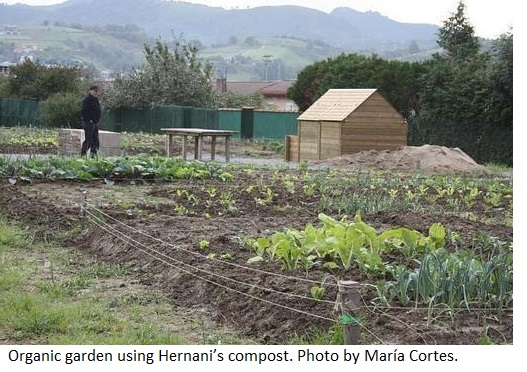
When the people of Hernani, Spain, began a residential compost system, they weren’t looking to become heroes of the movement for climate justice. Like thousands of other towns around the world, they were simply looking for an alternative to incineration and the pollution it brings.
Hernani is located in Basque country, in the province of Gipuzkoa. In 2002, theGipuzkoa landfill was nearly full, and the provincial government proposed building two new incinerators to burn the trash. The citizens of Hernani and other municipalities of the province immediately joined together in opposition. In a particularly impressive action, hundreds took the streets for what they called a “zero waste flash mob dance.”
Not only did Hernani fight the incinerator plans (and very creatively), they also began implementing zero waste strategies that would help eliminate the need to burn or bury waste at all. Within a few years, Hernani became a center of composting excellence.
To start, the municipality of Hernani distributed collection bins for each household so that residents could separate compost, recyclables, and other garbage, and passed a law that made it mandatory for residents to comply. By the end of the first year, the municipality had sent 58.3% less waste to landfill than the previous year.
Jesús Pérez Gómez of the Union Institute of Work, Environment and Health (ISTAS) in Spain explained that “compost is a very simple technology. Yet it has the solution to so many things. It’s good for the climate. It has the potential to reduce the high levels of unemployment in Spain. It reduces the toxics that impact agricultural workers. It reduces rates of cancer and other sicknesses. And we don’t have to invent anything, we just have to engage in a natural process.”
Just four years later, in October 2014, Hernani’s composting program was so successful that it became a site visit in training for recycling workers, lawmakers, and zero waste advocates from around the world.
Among the visitors were members of the South African Waste Pickers Alliance (SAWPA). “SAWPA supports a zero waste approach as it creates jobs, saves public money, and it combats climate change,” said Simon Mbata, national spokesperson for SAWPA. “Organic waste is a critical waste stream within a zero waste approach but it’s not included in South Africa’s Waste Act [2008], so coming to this training has been really useful to start developing organic waste strategies back home,” he added.
Even Better For the Climate Than We Thought
New science indicates that compost may be even better for the climate than previously understood. Research coming out of Marin County in California shows that compost takes carbon dioxide out of the air, which is an essential for reversing climate change.
According to the Marin Carbon Project website, “Common agricultural practices, including driving a tractor, tilling the soil, grazing, and other activities, result in the return of CO2 to the air….On the other hand, carbon can be stored long-term (decades to centuries or more) in soils in a process called -‘soil carbon sequestration.’ Carbon Farming involves implementing practices that are known to improve the rate at which CO2 is removed from the atmosphere and converted to plant material and/or soil organic matter.”
Talk about a win-win-win! Jobs, carbon-sequestration, and reduced toxic exposures for farmers and neighbors. For such a humble and ancient practice, composting is a powerful act. As the people of Hernani show us, when you organize to beat an incinerator, you never know how much good can come of it.
For more information see Global Alliance for Incinerator Alternatives (GAIA) and Other Worlds
